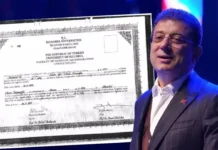President of the European Court of Human Rights (ECtHR) Róbert Ragnar Spanó, who is expected to visit Turkey this week, prompted criticism after it was revealed that he might accept an honorary doctorate from İstanbul University.
Spanó is an Icelandic judge who has been serving in the ECtHR since 2013 and was elected president of the court in May. His visit is part of his courtesy calls on member countries as the newly elected president. In the past, Spanó was president of the second section of the ECtHR that deliberated cases from Turkey.
According to a press statement from the Ministry of Justice, Spanó will also deliver the inaugural lecture of Turkey’s Justice Academy, where newly appointed judges and prosecutors receive professional training.
Critics say accepting an honorary degree from a public university, which is effectively controlled by the Turkish government, would conflict with the court’s stance and principles. According to a report by the US-based advocacy organization, Advocates of Silenced Turkey, İstanbul University has summarily fired 192 academics in the aftermath of a failed coup in July 2016.
Following the coup attempt, the Turkish government declared a state of emergency and launched a massive crackdown under the pretext of an anti-coup fight. Over 540,000 people were detained on terrorism-related charges, more than 80,000 were arrested or imprisoned and over 150,000 public servants were summarily removed from their jobs for alleged membership to or relationship with “terrorist organizations.”
In an open letter to Spanó, Professor Mehmet Altan, an economics professor and an outspoken government critic who was jailed in the aftermath of the coup attempt, talked about what agreeing to accept the degree would mean to him.
Altan worked as a professor at İstanbul University for 30 years and was summarily fired from his position in October 2016. He implicitly warned Spanó, saying court cases that he and other academics who were summarily fired brought against the university will most probably be taken to the ECtHR eventually and that Spanó would then be a judge with an honorary degree from the defending party. He also reminded Spanó that Gen. Kenan Evren, leader of the September 12, 1980 coup that led to human rights abuses on a massive scale, was given an honorary degree by the same university.
In his letter Altan also criticized the court for not taking up the case of his jailed brother Ahmet Altan, a famous novelist and journalist who is currently in prison on trumped-up terrorism charges, in a timely manner. The case has been waiting at the court for four years.
The ECtHR has been under increasing criticism for not deliberating cases from Turkey that were submitted after the July 2016 coup attempt. In a recent statement Filipe Marques, president of MEDEL, an NGO of judges and prosecutors’ associations throughout Europe, had said the ECtHR “should cease to consider the Turkish Constitutional Court as a source of effective remedy.”
According to Marques the ECtHR must look at issuing interim measures as a matter of its own credibility. “Four years later, we are still waiting for decisions from the [ECtHR]. I think the [ECtHR] must face this issue seriously and look at it as a matter of its own credibility – the reputation it has built during the years, of the main guardian of human rights in Europe, will be jeopardized if its decisions keep being ineffective because of the excessive length of procedures,” he said.
Under the ECtHR’s regulations, domestic judicial remedies must first be exhausted before individuals can have recourse to the ECtHR. To avoid possible convictions from the court, the Turkish government established a commission in January 2017 to evaluate the cases of those who were summarily fired from their public jobs during a state emergency that was in effect for two years after the coup attempt.
The commission was accepted as an effective remedy, and applicants cannot apply to the ECtHR before the commission rules on their cases. There are still cases pending before the commission more than three-and-a-half years after its establishment. Moreover, after the commission’s decision the applicants first need to go through Turkey’s administrative court system and ultimately the Constitutional Court before their cases are eligible to be heard by the ECtHR.















